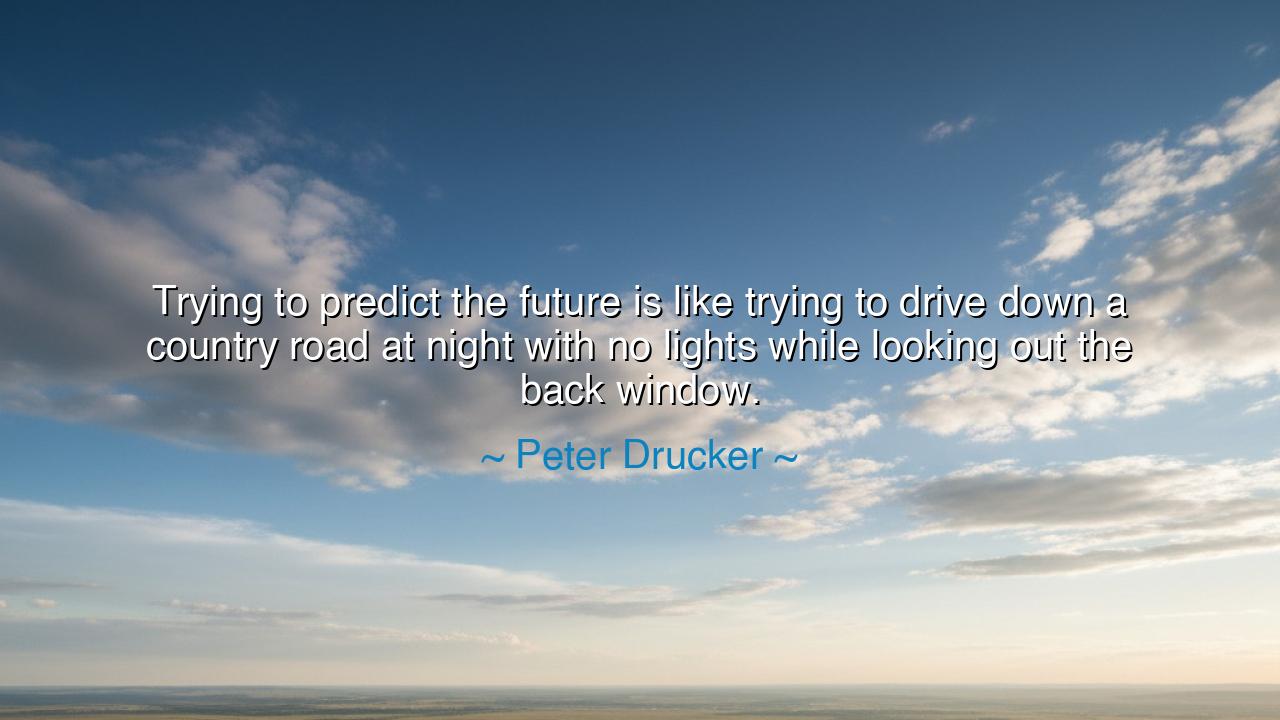
Trying to predict the future is like trying to drive down a
Trying to predict the future is like trying to drive down a country road at night with no lights while looking out the back window.






"Trying to predict the future is like trying to drive down a country road at night with no lights while looking out the back window." These words by Peter Drucker serve as a stark reminder of the uncertainty and unpredictability of the future. To attempt to foresee what lies ahead without proper guidance or tools is akin to embarking on a journey without clear vision, direction, or control. Drucker’s analogy paints a vivid picture of the futility of trying to navigate the unknown while clinging to the past, instead of embracing the present and the road that lies ahead. The future, in all its complexity, is something we can’t truly predict, just as a driver cannot navigate a dark, unfamiliar road while looking behind.
In the ancient world, fate and fortune were seen as forces beyond human understanding, often controlled by the gods or dictated by the cosmos. The Greeks had the concept of moira, the inescapable fate that guided the lives of men, and no matter how hard they tried, humans could not escape their destined paths. Similarly, the Romans had the concept of destiny, which was often viewed as an unknown road—one that, no matter how much one tried to control it, was always subject to the whims of the divine or the fortune of the gods. Cicero, in his writings, emphasized the importance of accepting the future as it unfolds, reminding us that human effort, while important, could only influence, not control, the course of things. Drucker’s words resonate with this ancient wisdom—the future is something that cannot be predicted by looking backward, just as one cannot move forward while focused on the past.
Consider the story of Alexander the Great, a figure who sought to shape his future through military conquest and vision. However, despite his strategic brilliance and bold moves, Alexander's future was unpredictable—the twists of fate, unforeseen circumstances, and the decisions of others played significant roles in his story. For example, after his conquest of Persia, his plans to return to Macedonia and further expand his empire were thwarted by the unexpected death of his closest companions and his untimely death. Alexander’s life illustrates that even the most powerful figures cannot fully control the future—no matter how great their vision or planning. He may have been looking ahead to the future, but as Drucker suggests, in reality, Alexander was driving through the uncertain road of history, often with the past influencing his decisions more than the road ahead.
Drucker’s analogy suggests that looking backward while trying to predict or control the future is an exercise in futility. The back window symbolizes the past—our memories, experiences, and historical data—that can shape our actions, but it cannot be relied upon as a map for the unknown. The ancient Chinese philosophers, particularly Laozi in the Tao Te Ching, advised against clinging to the past or trying to control the future. Instead, Laozi taught that we must align ourselves with the present moment, embracing the flow of life rather than resisting it. In his teachings, he reminds us that the way forward is often uncertain, but it is only through being in tune with the present and adapting to its ebb and flow that we can move forward with wisdom and grace.
A contemporary example of this concept can be seen in the technological revolution that swept through the 20th and 21st centuries. The rise of computers, the internet, and artificial intelligence completely changed the landscape of work, culture, and society. No one in the early 1900s, not even the greatest minds of the time, could have predicted the scale and pace of technological advancement. The world was driven forward not by the wisdom of the past alone, but by improvisation, adaptation, and creative action in the present. Those who succeeded in this new era didn’t dwell on the traditional business models of the past but embraced the present and created new paths forward, trusting in the unknown rather than trying to control it.
The lesson from Drucker’s words is that the future cannot be grasped by holding onto the past or attempting to predict it through outdated lenses. To navigate the unknown, one must be present and open to change, just as one would adapt to the shifting terrain when driving in the dark. The ability to embrace uncertainty and move forward with a sense of purpose and flexibility is far more valuable than the attempt to predict every turn on the road. As the Stoics taught, embrace what comes, and do your best with what you have—do not fixate on what you cannot control.
In your own life, take a moment to reflect: are you focused on what lies behind you—on past mistakes, past successes, or past knowledge—or are you fully present, ready to adapt and act in the face of the unknown? To navigate the road ahead, you must focus on the present moment, learning from the past without letting it control your future. Live with purpose, but be open to the twists and turns that come your way. The future will arrive unannounced, but if you are ready to embrace it without fear, you will be better prepared for the journey.






AAdministratorAdministrator
Welcome, honored guests. Please leave a comment, we will respond soon